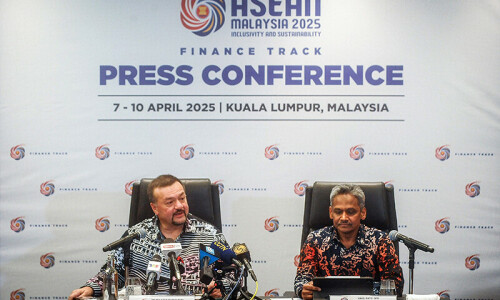ON Friday, the IMF team wrapped up its weeklong unscheduled talks on the Fund’s ongoing $7bn programme with the Pakistani authorities without making a customary end-of-mission statement, thus leaving most people in the dark about the outcome of the discussions. Some media reports have conjectured that the lender might comment on its findings soon. However, although we do not have all the details, it is clear from the information provided to journalists during the course of the talks that the Fund is seriously “concerned” over delays in the materialisation of foreign loans of $2.5bn, including a Saudi oil facility of $1.2bn, and the shortfall of Rs190bn in the tax collection target for the July-October period. The slow progress on the National Fiscal Pact, signed by the provinces and the centre, and delays in the privatisation of SOEs seem to have emerged as other areas of concern for the Fund, as the provinces have yet to align their farm and property tax rates with the federal tax regime.
It looks like the government is falling short of meeting several critical structural benchmark targets. Nonetheless, it still has some time to meet or, at least, move closer to, the targets as the first ‘formal biannual review’ of the bailout loan is expected to take place towards the end of February or early March. Dependent on a successful programme performance review is the disbursement of the next $1bn tranche and, more critically, the market’s confidence in the economy. The fact that fiscal deviations and delays in implementing other targets had alarmed the lender, compelling it to dispatch an early mission to protect the programme from derailment, indicates that the Fund would like to keep Islamabad on a tight leash. In spite of the strict implementation of the last short-term IMF SBA loan, Pakistan’s track record has not inspired much confidence in the country’s commitment to undertaking reforms. As they say, ‘once bitten, twice shy’ — multilateral and bilateral lenders are no longer in a mood to ignore the dilly-dallying on critical targets. The prime minister and his finance team have repeatedly pledged to make the current IMF bailout the country’s last. But that appears to be more of political rhetoric than a plan, given the way they have allowed powerful lobbies — retailers, real estate businesses and others — to influence the government’s economic decisions.
Published in Dawn, November 17th, 2024












































